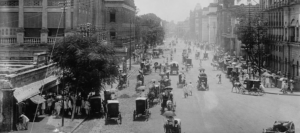The Global 1905: Facets of a Year; Facets of an Era
How do we experience historical events, and how do we decide what is important in history? This module examines several co-incident and interconnected historical developments from the year 1905 in order to interrogate our relationship to events at the time they occur, how we make meaning of them later on, and how they fit into bigger historical pictures. Through six planned class meetings, students will explore the following events of 1905: the Russo-Japanese War; the Russian Revolution; the British Parliament’s non-vote on women’s suffrage; and the Partition of Bengal. The conclusion also briefly covers Albert Einsten’s four ‘physics changing’ papers of 1905. The goal of the module is to encourage students to consider how people experience and understand events and their significance at the time they occur, and how they reflect on them later on – in essence, to understand the production of history. In addition, it also aims to help students think both about the ways the events of this single year were connected to one another, as well as the ways they were illustrative of the broader changes of modernity.
Original version authored by Steve Harris
Readings and Primary Sources
Module Lesson Plan:
- Global 1905-0.0-Module lesson plan
- Global 1905-0.1-Schedule at a glance
- Global 1905-0.2-About this module for students
Lesson 1:
Lesson 2:
- Global 1905-2.1-Reading 2-The russo-japanese war
- Global 1905-2.2-Primary Sources-The russo-japanese war
Lesson 3:
Lesson 4:
- Global 1905-4.1-Reading 4-Women’s suffrage in britain
- Global 1905-4.2-Primary Sources-Women’s suffrage in britain
Lesson 5:
- Global 1905-5.1-Reading 5-The partition of bengal
- Global 1905-5.2-Primary Sources-The partition of bengal
Conclusion:

